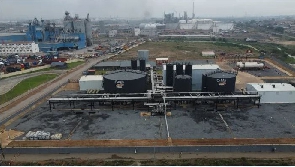GOIL PLC is gearing up to enter the West African bitumen market by introducing innovative products, specifically polymer-modified bitumen (PMB) and bitumen emulsion, as part of the company’s ongoing diversification efforts.
The company commenced bitumen production in the last quarter of 2022 after successfully constructing a bitumen terminal and production facility in Tema, Greater Accra Region.
The US$45million project is a joint-venture between GOIL PLC and Société Multinationale de Bitumes (SMB) from Côte d’Ivoire.
In an interview with the B&FT, Kwame Osei-Prempeh, Group Chief Executive Officer and Managing Director-GOIL PLC, stated that the priority is to meet the local market’s needs at the moment.
Currently, the leading oil and gas marketing company operates from a shared depot with SMB -importing bitumen from Côte d’Ivoire and subsequently processing it into bitumen emulsion and PMB. However, its ultimate goal, Mr. Osei-Prempeh noted, is to establish GOIL’s own bitumen processing facility similar to SMB’s.
“Our long-term vision involves constructing a plant right here in Ghana, capable of manufacturing bitumen. This strategic move will position us as direct competitors in the West African market, where SMB currently holds a dominant position. Notably, SMB lacks the capability of producing PMB and Emulsion, which gives us a unique edge,” Mr. Osei-Prempeh stated.
“If you’ve had the opportunity to visit our site, you may have noticed that we’ve designed it with expansion in mind. As we continue making strides in our journey, we anticipate that in the very near-future we will be able to extend our reach and serve neighbouring countries as well,” he added.
The facility has a capacity of approximately 7,500-8,000 metric tonnes per annum for both polymer-modified bitumen and bitumen emulsion.
“Some of the contractors who purchased our products have testified that it is among the best globally. Therefore, if we can capture the Ghanaian market and generate more revenue, we will have the opportunity to expand into other West African markets,” he emphasised.
Significant presence through PMB
Alphonso Okai Jnr., Head-Technical Services, added that the goal is to establish a significant presence in the West African bitumen market through the PMB product.
Polymer-modified bitumen (PMB) is a method of enhancing bitumen by incorporating polymers, and GOIL employs the styrene-butadiene-styrene (SBS) polymer in its PMB production.
This specific polymer has demonstrated effectiveness in mitigating the three primary pavement issues: permanent deformation (rutting), fatigue cracking, and low-temperature cracking.
“The game-changer in this industry is the polymer-modified bitumen. That’s what we will be introducing to the market. PMB possesses resilience and long-lasting features capable of sustaining and preserving our roads for longer periods,” Mr. Okai Jnr. said. “We therefore expect to produce enough quantities of PMB to meet demands of the road construction industry and serve as an export commodity to neighbouring countries, especially within the West African sub-region.”
Côte d’Ivoire is the main producer and supplier of bitumen to countries in the sub-region, including Ghana, Nigeria and Togo.
Decision to build a bitumen plant
GOIL’s decision to build a bitumen plant stemmed from a meeting with the Ghana Highway Authority in 2017, said Mr. Okai Jnr. During this meeting, they discovered that government planned to resurface about 10,000km of roads and build new highways and urban roads over the next seven years. Subsequent discussions revealed that approximately 192,000 metric tonnes of bitumen would be required to support some of these projects within the next two years.
He explained that the decision to go into bitumen production is therefore in line with the country’s efforts to build modern, well-maintained transportation infrastructure to boost growth and development in the transport sector.
“GOIL decided to take advantage of the opportunity to be a major player in the bitumen market. We made the decision to construct a bitumen plant to store, process and supply bitumen to road contractors,” Okai Jnr. shared with B&FT.
This step will also enable the company to broaden its range of offerings, he explains, saying: “We don’t want to solely focus on fuels; we aim to venture into something new. Therefore, entering the bitumen market diversifies our product lineup”.
Additionally, Okai Jnr. emphasised that the bitumen project will operate autonomously, much like Goenergy. “It will run independently and ensure its profitability. Just as we have Goenergy as our fuel import company, the bitumen project will also be a subsidiary within our broader framework – allowing us to expand our presence,” he explained.
The partnership
In June 2019, John Peter Amewu, former energy minister, cut the sod for the commencement of the groundbreaking partnership between GOIL and SMB.
Under this arrangement, GOIL holds a 60 percent ownership stake in the venture while the remaining 40 percent was allocated to SMB, responsible for supplying the raw bitumen material.
“This is solely related to storage and distribution,” Mr. Okai Jnr. noted, clarifying that the production of PMB and emulsion bitumen is exclusively owned by GOIL.
He described the partnership as crucial for ensuring a consistent supply of the base product needed for PMB and bitumen emulsion. “It’s a strategic collaboration, ensuring a steady product supply for our customers, and we aim to be highly competitive in terms of pricing thanks to this joint venture,” he says.
The primary operations of the facility, which was completed in August last year, include transferring bitumen from bitumen tanker vessels at the oil jetty to the terminal; storing bitumen AC 10 and AC 20 in dedicated tanks; producing polymer-modified bitumen and bitumen emulsions; conducting laboratory quality testing; and distributing products via bitumen bulk trucks, bitutainers and drums.
The Terminal comprises two bitumen storage tanks (1X4,000mt for AC 20 and 1X2,000mt for AC 10), one blend stock tank (450mt capacity), two 15mt mixing tanks (for PMB), three 133mt letdown tanks (for PMB), and two 133mt emulsion storage tanks. Additionally, there is a 3km cargo receipt pipeline connecting the oil jetty and the terminal, internal pipelines for tank-to-tank transfer and delivery at the loading rack, as well as a well-equipped laboratory for comprehensive quality testing of all bitumen grades to ensure they meet the required specifications.
Saving the cedi
Kwame Osei-Prempeh, Group CEO and MD-GOIL PLC, believes the project has enough potential to save the country millions of dollars spent annually on importing bitumen.
He stated: “If the contractors patronise our products instead of importing them, then we will be able to expand and help government obtain quality bitumen locally – reducing reliance on foreign exchange”.
Currently, Ghana imports bitumen from Cote d’Ivoire and Brazil for road projects.
Business News of Wednesday, 27 September 2023
Source: thebftonline.com

















